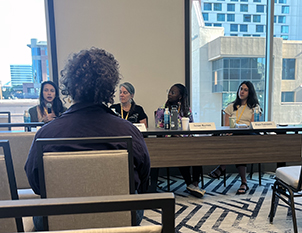 Climate change makes pregnancy more dangerous, impacts reproductive health, journalists say
Climate change makes pregnancy more dangerous, impacts reproductive health, journalists say
This is the 1st in a series of feature stories on environmental topics by Knight Center students who attended the 2025 Society of Environmental Journalists conference.
By Clara Lincolnhol

Clara Lincolnhol
There is no such thing as an “uncomplicated pregnancy” now for most women, thanks to climate change, said journalists at the 2025 Society of Environmental Journalists Conference.
Pregnant women use more oxygen and water than non-pregnant ones, making them more sensitive to changes in their environments.
They also have a harder time regulating their body temperature, said Jesssica Kutz, a reporter for The 19th.
Climate change directly affects pregnant women through warming temperatures and worsening air quality, making pregnancy more difficult and dangerous, she said.
It can also impact accessibility to, and the effectiveness of, contraceptives. For example, many Americans order birth control pills by mail, but if temperatures climb too high while the pills are in an enclosed space, like a mailbox, they become ineffective, Kutz said.
Climate change-induced natural disasters limit accessibility to reproductive health care by making it physically impossible at times to receive care. That can be through closures, damage to health centers, impassable roads and power outages that render certain medications unviable, she said.
Studies and anecdotal evidence from doulas have shown that expecting mothers living in conditions of extreme heat have given birth to premature babies more frequently, said Virginia Gewin, a freelance science reporter.

Reporters Jessica Kutz (left), Virginia Gewin (second from left), Jenae Barnes (second from right) and Zoya Tierstein (right) speak at the “Reporting the Overlooked Link: Reproductive Health, Justice and the Climate Crisis” panel at the 2025 Society of Environmental Journalists conference in Tempe, Arizona. Credit Clara Lincolnhol
People facing economic hardship don’t always list their environment and reproductive health as main concerns, but they are still significantly affected by climate change and environmental pollution, said Janae Barnes, a health journalist for Capital B.
“When people are worried about how they’re going to pay their extremely high utility bills because it’s getting hotter and colder, they’re not so much worried about how much air pollution that they’re breathing in,” she said.
The impacts of climate change on pregnancy are not widely reported on, but should be, said Zoya Tierstein, a reporter for Grist.
The Trump administration is removing online federal climate data sets like the Future Climate Risk Index making it harder for people to stay informed about the quality of their environment.
All four journalists said they have faced problems accessing formerly public data since the beginning of the Trump administration.
Removing tools and knowledge does not stop climate change from happening and people from being impacted by its effects, they all said.
“While the data might be being erased, the people are still here,” said Barnes.
